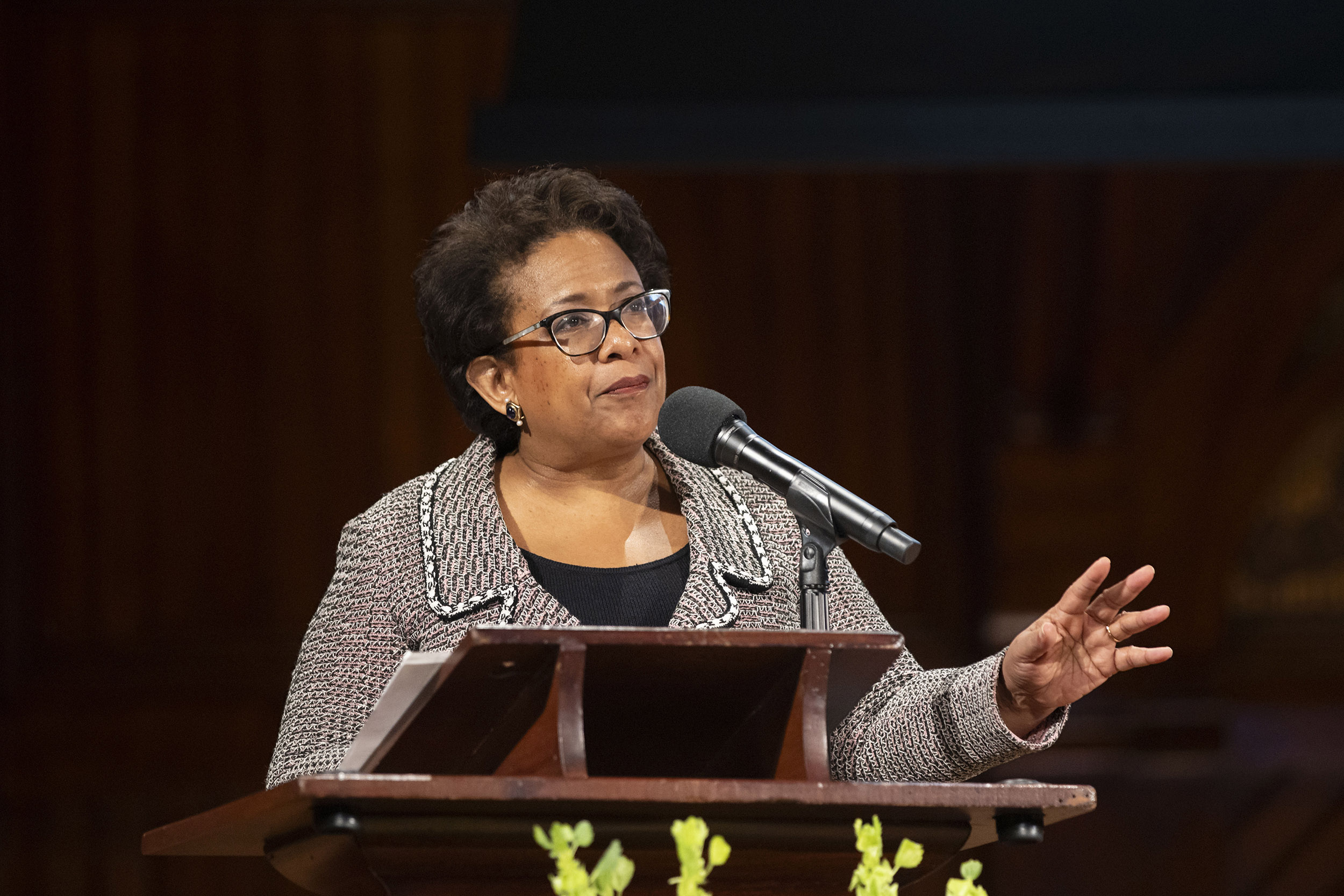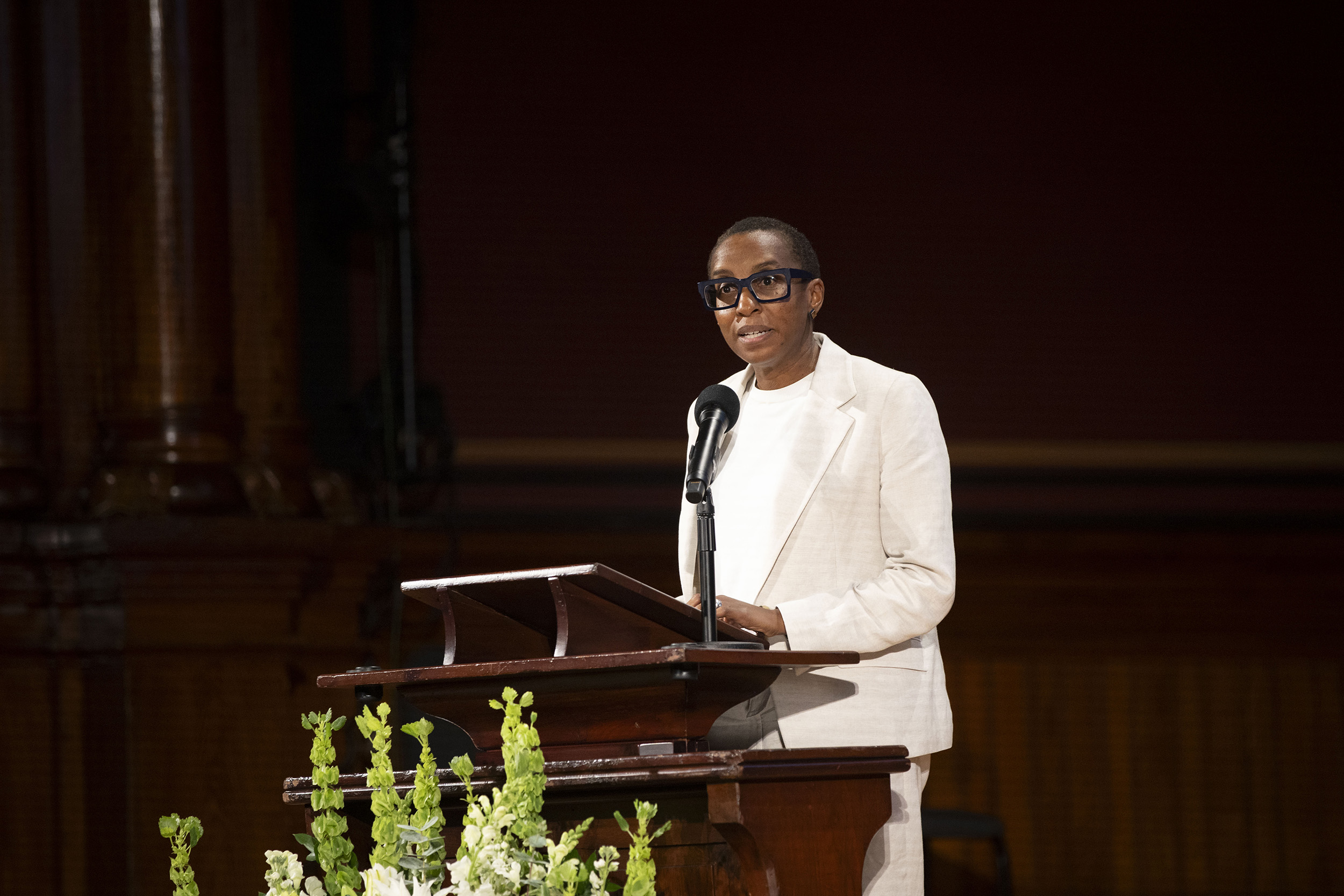
Former U.S. attorney general Loretta E. Lynch at Sanders Theatre.
Photos by Niles Singer/Harvard Staff Photographer
Keeping faith in time of political, social backlash
Former AG Lynch argues arc of moral universe may bend toward justice but is long, requires devotion to progress in MLK address
Former U.S. attorney general Loretta E. Lynch invoked the words of Martin Luther King Jr. Wednesday in calling on a campus audience to reclaim his legacy and remain hopeful in the face of the “reversal of decades of progress.”
“As we look at today’s efforts to limit our democracy, to suppress our history, and to close down our pathways to equality, the lesson from this historical moment is that the pendulum has swung this way before and it might do again,” said Lynch ’81, J.D ’84, referring to recent rulings by the Supreme Court and actions in some states on voting rights and public education.
“King said the ultimate measure of a man is not where he stands in moments of comfort and convenience, but where he stands at times of challenge and controversy. Well, my friends, here we are. Now it’s our time of challenge. Now it’s our time of controversy.”
The 83rd U.S. attorney general, Lynch spoke at Sanders Theatre as the 2023 honoree of the Dr. Martin Luther King Jr. Commemorative Lecture. Organized by the Office for Equity, Diversity, Inclusion & Belonging, the annual event recognizes individuals for their contributions to advancing justice and equality. Lynch was the second woman, and the first Black woman, to serve as the nation’s top law enforcement official.

Harvard President Claudine Gay opened the ceremony by drawing on King’s words when he came to Harvard in 1962 to talk about the future of integration. In his speech, the civil rights leader spoke about civil disobedience as a necessary tool to achieve real change amid long entrenched practices and prejudices.
“Hopefully, this gathering will give us the courage that we need to meet tomorrow with urgency and hope, to meet the moment as a community that’s devoted to human progress,” she said.
Lynch grew up in Durham, North Carolina, as the daughter of a librarian and a Baptist minister who both took part in the Civil Rights Movement and inspired her career in public service and commitment to justice. She was also moved by the example of her grandfather, a sharecropper who sheltered Black men facing the injustices of Jim Crow. Social progress, Lynch said, is the result of work and sacrifices of ordinary people who stand up to the system despite fears of reprisals.
Fifty-five years after King’s assassination, Lynch said, the fight to achieve equality remains long and hard and requires constant vigilance.
“The road to equality in this country has always taken twists and turns and downright reversals, but we have always, always pushed forward,” said Lynch. “In fact, all our greatest advancements have often come after our darkest moments.”
History teaches us that civil rights struggles are not new, and that progress can be achieved with a mix of work and hope, said Lynch. She lamented the current state of affairs, including political polarization, book banning, and Supreme Court rulings that have overturned precedents, but said the fight must continue.
“As we watch the wave of irrationality, trying to roll back years progress and prevent us from claiming the equality that is our due as Americans, know this: the strength of this backlash directly reflects the power that it is trying to suppress: our voices, our votes, our very presence in this democracy. We have the power to withstand and overcome forces of aggression, or else they wouldn’t spend so much energy trying to keep us down.”
During her tenure as attorney general, Lynch worked to ensure equal protection of the law, notably in defense of LGBT equality in the Supreme Court case Obergefell v. Hodges, which made same-sex marriages legal in all 50 states. She also defended the Voting Rights Act, challenged discrimination against transgender people, and worked to reform law enforcement practices and police training.
The event included a discussion with two Harvard students. One of them, Ananda Birungi, a senior concentrator in social studies and psychology, asked Lynch to reflect on her legacy. Lynch first quipped, “I didn’t know I was done,” and then pointed to her time as AG.
“When I first became attorney general, I focused on things like national security, human trafficking, and computer crimes and cybercrimes,” said Lynch. “It soon became clear that law enforcement and community issues were emblematic of so many larger issues in society, and they took center stage, and then the issues affecting the LGBTQ community took center stage as well. I would hope my legacy will be that, throughout a number of storms and challenges, even though I was not able to always prevent harm, or maybe even in some people’s views bring remediation, that I have always tried to bring justice.”




